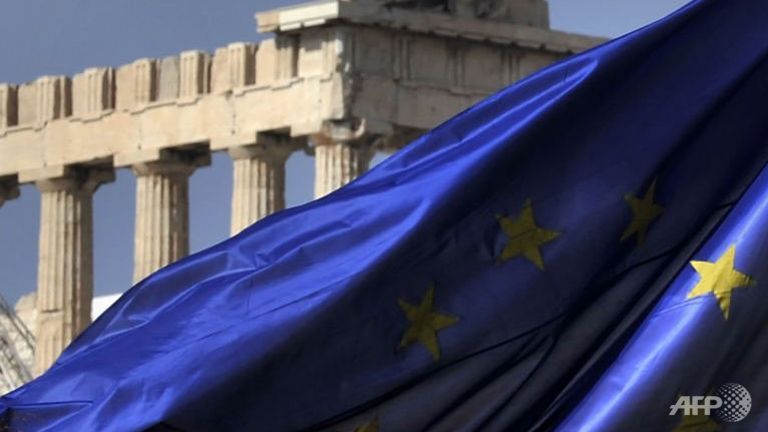Greece asks for fresh IMF aid in step closer to bailout
 |
| Columns of the Parthenon temple are seen behind an EU flag in Athens. (AFP/Louisa Gouliamaki) |
ATHENS: Debt-crippled Greece on Friday (Jul 24) took a step closer to a huge third international bailout by formally requesting International Monetary Fund (IMF) for help, but sources said "logistical problems" were delaying the start of talks in Athens.
The Greek government, which is seeking a three-year bailout worth up to 86 billion euros (US$94 billion, S$128 billion) to avert financial meltdown and a chaotic exit from the Eurozone, had initially planned to go without fresh help from the IMF as it considers the agency too wedded to draconian austerity measures.
But in a letter to Christine Lagarde, the managing director of the IMF, Finance Minister Euclid Tsakalotos wrote that Greece was "seeking a new loan" from the IMF. He noted that the Greek parliament has passed two laws enshrining a series of tough reforms demanded by the creditors, including tax rises and a pension overhaul, in a step closer to finalising the deal.
"The Greek authorities have committed to implement a number of policies that would enhance fiscal sustainability, strengthen fiscal stability, sustain long-term growth and, importantly, spread the cost of economic adjustment in a fair way," the finance minister wrote in the letter, which was dated July 23 and released to the public on Friday.
"It is our belief that it will take several quarters before the Greek economy faces up to these challenges and returns to a vigorous and sustainable path to growth with fairness and social inclusion," he added.
Tsakalotos confirmed that Greece, which has been bailed out by the European Union, European Central Bank and IMF twice since 2010, had already formally requested a new three-year loan from the Eurozone's bailout fund, the European Stability Mechanism.
Greece's existing aid programme from the IMF runs until early 2016, and the letter appears to have been a gesture of goodwill as a new request is not technically necessary.
The request came amid an apparent delay in getting the ball rolling on talks to finalise the package. Negotiators from the creditors, known collectively as the troika, have not set foot in Athens for more than a year as hostility has grown between the two sides.
Greece had said on Thursday that negotiators would fly in to Athens on Friday to begin the talks, but this swiftly became "in the coming days", according to a European Commission spokeswoman, with the location of the talks and offices for the creditors apparently among the sticking points.
"The mission is being prepared. We are still discussing a location as we have to find an accessible place to work, near the ministries," a source close to the negotiations said.
The two sides are under enormous pressure to hammer out the rescue deal before August 20, when Athens is scheduled to make a loan repayment of 3.2 billion euros to the ECB that it cannot currently afford.
‘A DIFFICULT PATH AHEAD’
The IMF warned on Thursday that finalising the deal, which is conditioned on Greece implementing painful reforms, would not be easy. The Fund took part in the two previous bailouts but has said it will only participate this time around if European creditors reduce Athens' debt burden to a level it considers "sustainable".
"Clearly it's a difficult path ahead, we're just at the beginning of the process," said IMF spokesman Gerry Rice.
In the early hours of Thursday, the Greek parliament passed further reforms demanded by creditors for the talks to begin, including changes to the justice system, a bank deposit protection scheme and measures to shore up the liquidity of Greece's banks.
The bill passed by a resounding 230 votes out of the 298 members of parliament present, after a five-hour debate that once again exposed deep divisions in the governing Syriza party over whether to accept more austerity.
While the result is a victory for Prime Minister Alexis Tsipras in that he managed to convince parliament to back him on the bailout, he did suffer a major rebellion from Syriza MPs for the second time in a week - prompting analysts to predict he may be forced to call early elections.
What the stars mean:
★ Poor ★ ★ Promising ★★★ Good ★★★★ Very good ★★★★★ Exceptional
Latest News
More News
- Russian President congratulates Vietnamese Party leader during phone talks (January 25, 2026 | 09:58)
- Worldwide congratulations underscore confidence in Vietnam’s 14th Party Congress (January 23, 2026 | 09:02)
- Political parties, organisations, int’l friends send congratulations to 14th National Party Congress (January 22, 2026 | 09:33)
- 14th National Party Congress: Japanese media highlight Vietnam’s growth targets (January 21, 2026 | 09:46)
- 14th National Party Congress: Driving force for Vietnam to continue renewal, innovation, breakthroughs (January 21, 2026 | 09:42)
- Vietnam remains spiritual support for progressive forces: Colombian party leader (January 21, 2026 | 08:00)
- Int'l media provides large coverage of 14th National Party Congress's first working day (January 20, 2026 | 09:09)
- Vietnamese firms win top honours at ASEAN Digital Awards (January 16, 2026 | 16:45)
- ASEAN Digital Ministers' Meeting opens in Hanoi (January 15, 2026 | 15:33)
- ASEAN economies move up the global chip value chain (December 09, 2025 | 13:32)
















 Mobile Version
Mobile Version